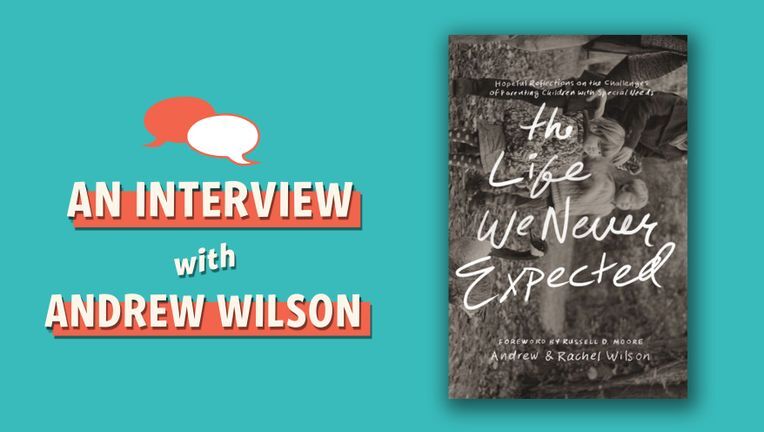The Life We Never Expected: An Interview with Author Andrew Wilson
The Life We Never Expected, the newly released book about special needs parenting from Andrew and Rachel Wilson, starts with this –
“This is a book about surviving, and thriving, spiritually when something goes horribly wrong. In our case, that “something” was discovering that both of our children had regressive autism. This book, then, is a mixture of our story and God’s story, and the way in which his shapes ours.”
The Wilsons, who have three children, two of whom have severe regressive autism, released their book in the UK last year and it was released just recently in the US.
I sat down and read almost the whole book in one sitting. I was mesmerized, my eyes full of tears, my head and heart nodding along with every resonant word the Wilsons wrote. The Wilsons approach their story with a raw and gritty, Gospel-soaked hope that makes you simultaneously wonder and worship the God who made such special children and blessed them with such faithful parents. The Life We Never Expected is a passionate study of grief and the God who promises to wipe every tear from our eye. It is a wonderful read for parents and friends of special needs children, but also for every person who has experienced profound disappointment and grief in their life.
I spoke with Andrew Wilson for the Minno Life blog, and he gracefully shared some more of his own story and helpful hints for how to support the special needs children and their parents in your life.
MR: Why did you decide to write this book now while you are relatively new at special needs parenting?
AW: We wonder that too. I think the honest answer is that we were looking for something like this when we were in the middle of it. We found that with parenting books generally, a lot of them were written by people who were quite a lot older by which time a lot of the edge, the rawness of things has faded a little bit.
MR: I know for me, just being in the weeds of general parenting, I found myself thinking, “I know what that feels like,” even if not nearly to the depth. I think the parts of the book about lament and grief were so powerful. I know you have a background in theology. How do you bring that background into your parenting with your kids?
AW: In so many ways I’m still trying to figure that out. I think what parenting does – and I think this would be true for all parents, not just special needs parents, it makes some some of the things you believe – you realize how true they are.
I believe in providence, I believe that God is sovereign, but it is only when I am in this that I actually have to cling to it in that way. I believe that bad works for good, but now that I’m faced with it it’s much harder to say it glibly. I have to actually live through it.
In many ways, I don’t think it particular changes the theology, as much as it makes you have to live the theology you think you believe. And in some ways, it exposes where you don’t quite believe it.
The next question refers to a quotation from the book:
“Celebrating the gospel is beautiful and is good for my soul, but it doesn’t make me sleep more or cry less. Until God fixes everything, I’m still waiting”
MR: There was a section in the book where you said – celebrating the Gospel is good but it doesn’t make me sleep more or cry less. I thought that was really powerful because I think especially in the Western world there tends to be a “Christianese” or “greeting card” response to when bad things happen. And I don’t think millennial parents, our generation of parents, respond well to that. We want authentic responses even when they’re unpleasant. I wondered if you could talk to me a little bit about your journey though that.
AW: It’s not that you wake up one day and say “I’m going to decide to be more authentic in my faith.” That’s not how it comes. I think for me, it came in explosions and I couldn’t hold it back. I just felt absolutely wrecked and I didn’t know what to do with myself, and I was just lying on the floor crying, I couldn’t cope.
In some ways, it’s like in doing that, you then recover from it. How do I make sense of what’s happening, what I’m feeling?
Then of course you start reading the Psalms for instance – and the Psalms are the best place I think for this – in a completely different way. Different psalms start leaping out of of the Psalter to me and becoming real. And so instead of saying I must have a rounded view – I must celebrate some days, lament some days, cry out to go “how long o Lord” some days, thank some days … it doesn’t work like that, does it?
I think what happens is the Psalms voice the things that you already feel. And in different seasons of life, you’ll tap into different ones of them.
Rather than disciplining yourself to feel what the Scriptures say, you are actually finding as you feel that the Scriptures have already said it and are speaking what you want to say better than you can.
MR: What are some of the most meaningful gifts that you would say your community has given you or ways that other people and other parents can come alongside special needs parents and really support them as a community?
AW: I think the most helpful thing that people do is when they ask you what it’s like and how they can help – and what the children are like. Because I think the tricky bit is when people assume they’ve met another person with a need or with autism or something and they think it must be like that for you, and so we’ll do this. Or even they’ve just heard someone like me say something in an interview like this and they say “oh that’s of course what autistic people need” and then it often isn’t the case. Instead I think going and saying “look, things must be difficult. What’s it like? What are they like? What about the child – what do they appreciate, what do they not appreciate?”
A lot of people in church want to kind of go “oh, hi” (in their face) and they just run away. And actually the adults, we say at that point – “well to be honest, Anna doesn’t really like, for a season, to be spoken to. That would really help her, if you just give her space … That would actually serve her much better than if you try to engage.” And that’s a weird thing to say to someone, but actually they only know that if they had asked initially “what are they like?”
And I suspect again this is true for parents across the board because they’re all different. I think particularly with our sort of special needs kids, just going up and saying “Wow, what’s it like? What’s it like for you? What’s it like for them? And what’s best? How do we help? Is it prayer? Is it meals? Is it people to come up and wake up the children some mornings if we can sleep in?” And all of those things have been true in different seasons, but I think that question is probably the one that is most important.
MR: That’s really helpful to think about. Kids react differently. I know in your book you talk about the different stages, and you even said in the beginning of the interview, your kids are very different now than they were when you were writing the book. It’s constantly being aware of it and then also not lumping all special needs kids together and saying “oh those kids are autistic, they must all behave the same way, because that is a disorder that manifests itself in so many different ways, and probably differently even in your own home.
AW: Oh totally- Anna and Zeke are very different … I just thinking coming in with that question – it honors the parents as well, because they are able to say “this is where we are now, this is our take on things.” In some ways that’s the best advice I would give – don’t put it down to one piece of advice.

